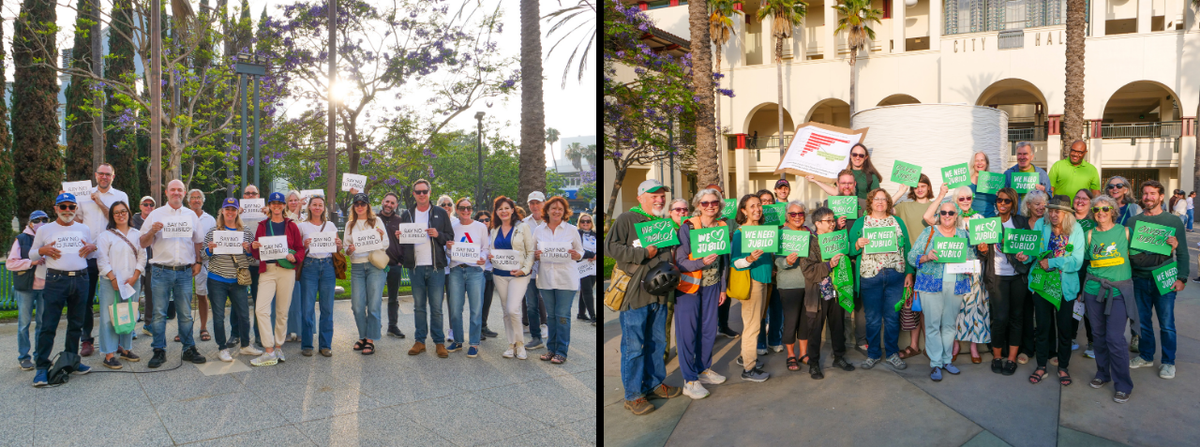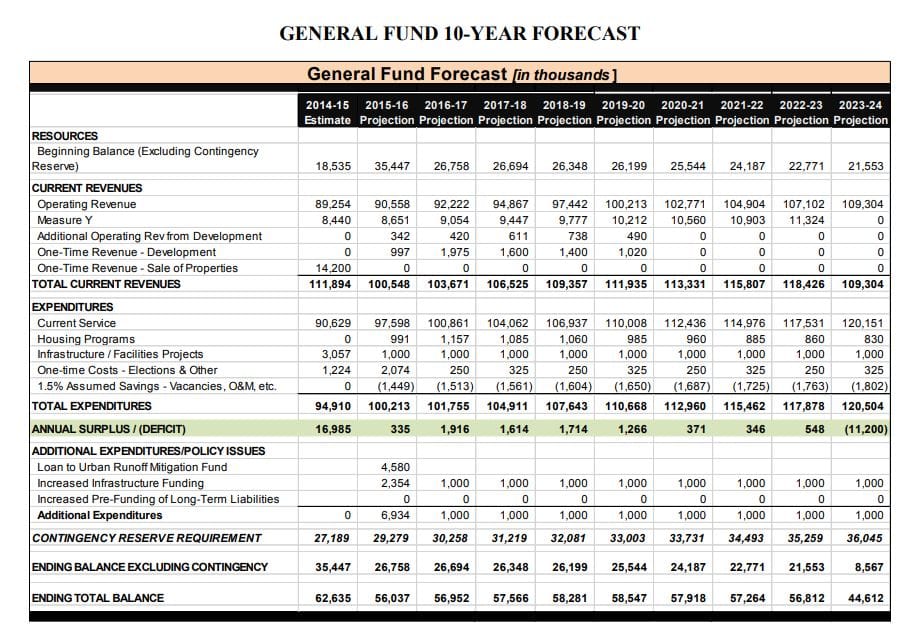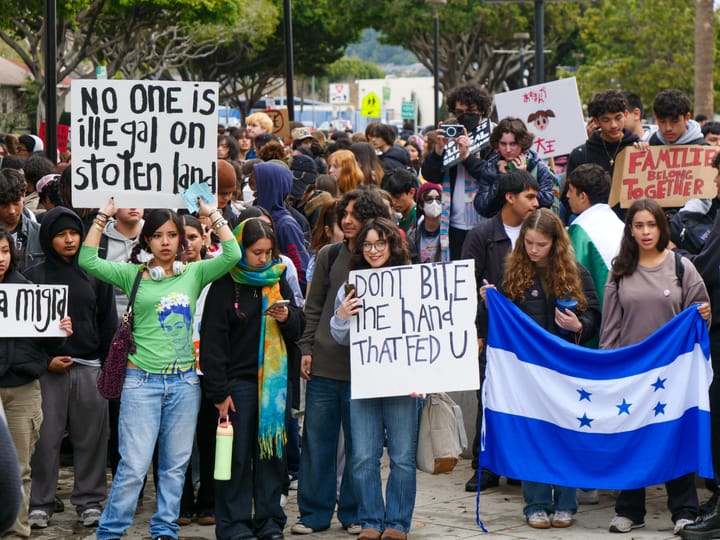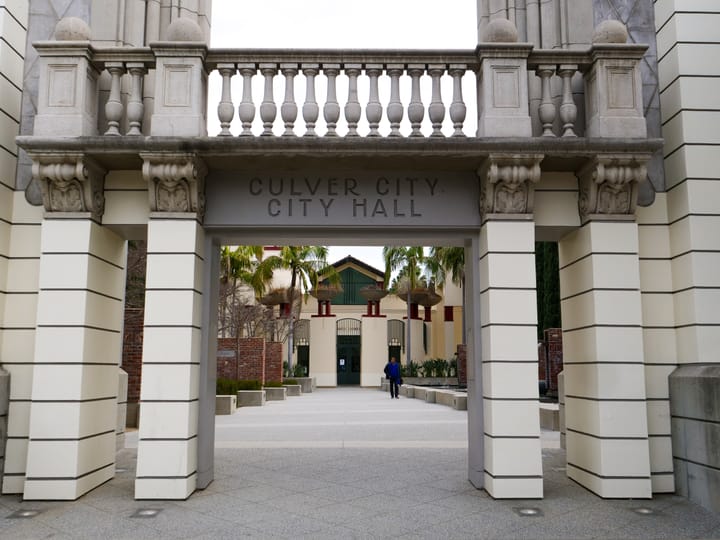Council officially commits to Jubilo Village in split vote
The affordable housing project planned for Culver-Palms United Methodist Church has forced the city to weigh financial concerns against the urgency of the housing crisis.

Patches of green, white, and red filled the Mike Balkman Council Chambers Monday night as the Culver City Council made one of the most potentially consequential decisions in recent city history.
In a 3-2 vote, the monetary commitment to the Jubilo Village affordable housing project was officially cemented as part of Culver City's 2025-2026 budget, which was formally approved by the city council Monday night. The $16 million additional commitment to developer Community Corporation of Santa Monica for the project that will add 93 units to the city's affordable housing stock brings the total the city has given up to $20 million.
Before Monday's meeting, two separate factions gathered in the courtyard of City Hall to rally support for or against the commitment to Jubilo Village. Each side wore distinct colors to identify their cause: green shirts with green signs for those in favor of Jubilo Village and white shirts with white and red signs for those against.
Supporters and detractors of the project stayed in the Mike Balkman Council Chambers through the final hours of Monday night to voice their thoughts on the project's merit or lack thereof.
When it came time to vote for the budget — which included approval of the commitment to the Jubilo Village project — the council's opinion was split. Much of the discussion was centered around the city's financial health, the level of financial peril this commitment could incur, and whether that was acceptable to take on to introduce affordable housing in Culver City.
By approving the budget as presented Monday night, the council also amended a requirement for a General Fund Contingency Reserve Fund at least 30% of the fund's Operating Budget for the 25-26 Fiscal Year. The reserve is expected to end the next fiscal year with a fund balance of $41.6 million, 21.6% of the General Fund budget.
Monetary concerns were the crux of many residents' reservations about the project, including the council members who voted against it: councilmember Albert Vera and Mayor Dan O'Brien.
Two council members — Bubba Fish and Yasmine-Imani McMorrin — did not want to allow financial worries to stop an essential and unique 100% affordable housing project, particularly because they believe those financial woes are not entirely tied to the increase in housing spending.
"It didn't appear out of thin air," Fish said of the operating deficit. "It wasn't caused by affordable housing or Jubilo; it has been building over the past two years."
While the city's expenditures did not outpace revenues until 2023-24, Fish pointed to budget projections from the city's adopted 2015-16 budget that predicted the city would face a deficit that year, long before the COVID-19 pandemic or housing projects like Jubilo, the Wellness Village, and Project Homekey were even conceived.

While the projected deficit in the 15-16 budget seems tied to a revenue decrease due to the forecasted sunsetting of Measure Y — Culver City's half-cent sales tax measure extended until 2033 as Measure CC — Fish pointed out that the reality is the deficit started around when it was projected to a decade ago, which he argues demonstrates a deep-rooted problem in the budget process.
In his Budget Message, which serves as an introduction to the document, City Manager John Nachbar attributed the current deficit to more recent expenditures, with the explosion in spending in the Housing and Human Services Department being seen by many as the primary driver.
"Beginning in Fiscal Year 2023-2024, with the addition of new programs and initiatives, the City's operating expenditures outgrew the City's operating revenues," Nachbar's budget message reads.
The city will now be even more reliant on a quarter-cent sales tax measure appearing on a special, all-mail ballot election in August to close the gap in the budget. Without that increase to supplement the city's revenues, cuts to city personnel and services are likely on the horizon.
But Fish argued that it was difficult to reconcile a hesitancy to commit to a project like Jubilo Village that will bring needed affordable units to Culver City for financial reasons with a refusal to evaluate the city's spending.
He pointed to the recent consideration to outsource lifeguards that generated outrage among residents, a budget process that includes significantly less public interaction than for other city plans, and a lack of communication with Culver City Unified School District on its financial needs despite an attempt by the district to engage in those conversations as evidence that it was not Jubilo Village and affordable housing at the root of the budget problem.
Fish instead suggested that the lack of willingness to analyze spending — which resulted in a balance of appropriations that doesn't respond to changing community needs and wants — was one of the core causes of this deficit.
"It's clear that protecting the city's finances might be a factor, but it is also about protecting the status quo," Fish said of the opposition to Jubilo Village. "How can we have an operating deficit for two years, declare a fiscal emergency, ask our residents for more revenues, and in the same breath claim our budget process doesn't need any improvement?"
Fish also argued that this hesitancy represented a lack of respect for the gravity of the housing crisis and a lack of understanding of how to address it properly. He said that was demonstrated when, in his belief, the Local Emergency on Homelessness declared in January 2023 was used to justify the rushed passage of an anti-camping ordinance.
"In LA County, 2,500 people die on our streets every year," Fish said. "Now, when we have a real opportunity to address homelessness in a meaningful way, we are all of a sudden not in an emergency."

McMorrin's argument stemmed from a more philosophical approach. She stood firm in her creed of not allowing fear to dictate her decisions, arguing that innovation and new ideas can help solve problems that may come in the future, and the uncertainty of what's ahead shouldn't stop the city from doing good.
"I have always said more than the status quo is possible, and it is safe to dream of a Culver City not rooted in fear or exclusion," McMorrin said. "It is safe to welcome new neighbors here."
She also asserted that her decision was based on her belief in the value of equity. Ensuring that all community members are served — whether they live, work, or play in Culver City — is at the core of why she decided to serve on the council, and she believes this project aligns with that mission.
"When we take care of each other and when we see the humanity in one another, we can actually be the change that we want to see," McMorrin said.
Councilmember Vera used a series of questions to staff related to the potential consequences of the financial burden this commitment could cause. The answers to these questions illustrated a bleak picture for city services if the city's voters do not approve August's tax increase.
"We would have to make cuts to expenditures...most likely that would be cutting personnel," Chief Financial Officer Lisa Soghor said.
Aside from his fiscal concerns, Vera was displeased that there wasn't a more robust pipeline for those he feels are most in need of Jubilo. Housing and Human Services Department Director Tevis Barnes said residents in the city's existing supportive housing sites — most of which considered Acutely Low-Income — would be competing for a pool of just 10 units at Jubilo Village.

Mayor O'Brien said that Jubilo Village was not the end-all-be-all for affordable housing in Culver City, professing belief in the production that will come from the approximately 550 affordable units currently in the pipeline outside of Jubilo Village.
While these projects are not finalized, and some may not materialize, O'Brien argued their existence and the lack of financial burden they incur on the city minimized the need to take financial risks to build affordable housing.
"If it wasn't for this enormous cost on the city, [I would] absolutely [support] this project," O'Brien said. "But we are here to have a fiscally sound city, and I can't support putting all this money into one place."
However, Vice Mayor Freddy Puza — the only council member seemingly not set on their decision coming into Monday's meeting — had concerns about the uncertainty of pipeline projects. He also pointed out that while some of these projects are free to the city, others can burden the city with indirect costs, such as occupying land that the city could lease to generate revenue.
"There are still a lot of unknowns related to these projects," Puza said, "and they are years away."
Council members who were hesitant to move forward also argued that the motivations for supporting the project extend beyond housing. Vera and O'Brien supported a similar theory: by burdening the General Fund with this project and forcing the city to consider cutting services, activists could create an opportunity to push for reallocating funds from the Culver City Police Department into other departments.
O'Brien took particular exception to Fish's reference to an increase in the Police Department's budget from around $33 million in 2014 to more than $60 million in this budget. He claimed Fish was misrepresenting the numbers to try to paint a picture of the Police Department's skyrocketing burden on city finances when CCPD's share of the General Fund budget had actually decreased from 35% to around 30% during that time.
"Let us just say the quiet things loudly," O'Brien said. "For a large percentage of these advocates, this is about ultimately defunding [the police]."
But Fish argued that defunding was not the goal, only a reevaluation of the city's priorities. He told Culver Crescent that his concern lies in the disparities in growth between the Police Department and others in the city over that time.
The $29.2 million increase the Police Department has seen since the 2013-14 budget is greater than the total allocations for the HHS in both 2025-26 ($20.5 million) and 2024-25 ($23.4 million), but the rate at which spending has increased is similar to other departments.
Before Monday's meeting, Puza released a statement explaining his position on the Jubilo Village decision. He said that he would support this and other affordable housing projects in the future only if certain conditions — which he reiterated during his comments — were met.
One of Puza's requirements was a preference for Culver City residents, which Community Corp. has encouraged. Vera hoped to give a more pronounced preference to Culver City through methods like giving exclusive early access to the application for people from the city, but actions that could be seen as excluding people from the application are considered a violation of the Federal Fair Housing Act.
The other two conditions were that project-based vouchers must be guaranteed and that projects approved by the council should include financial contingency plans in case of tariffs or emergencies.
"I believe housing is a human right," Puza said. "If these conditions are met, this project is a strong step towards that goal."
Puza served as the tie-breaking vote that pushed the motion over the finish line. However, the story might not yet be over, as litigation related to this decision may be inevitable.
"At the end of the day," Puza said, "I have to make the decision based on what is right and just and best for the city."




Comments ()